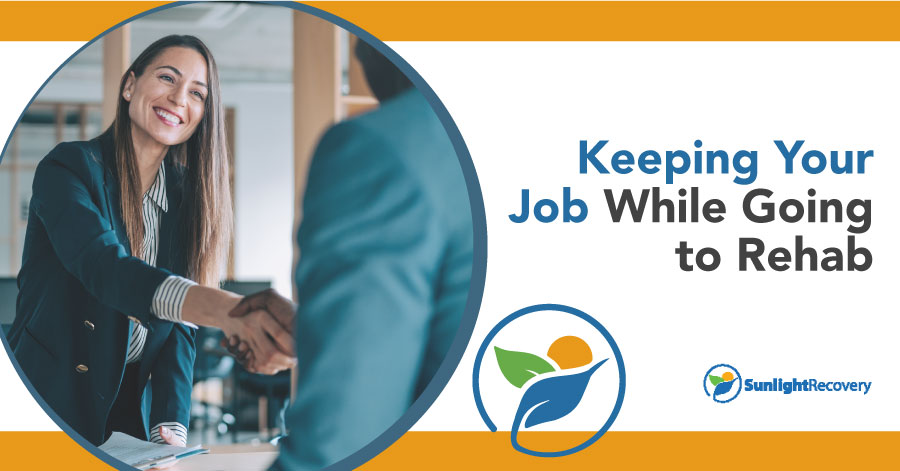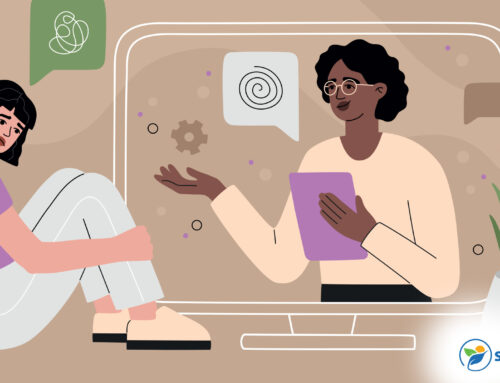Is it possible to balance rehab with work? The issue of staying employed to support a family is one of the most common reasons not to make a commitment to getting clean. But is it accurate?
At Sunlight Recovery, we strive to make sure everyone who needs help for themselves or their loved ones is armed with the information they need to access it. In this piece, we’ll explore the details involved with going to rehab while keeping a job.
“I Can’t Go to Rehab, My Job…”
Feeling like there’s an urgent need to put your job before your health is understandable. After all, many people need to work at least one job to support their families. For these people, leaving for any reason — no matter how critical to their long-term health and wellness — is not an option.
This may contribute to the fact that according to reports, less than 10% of working adults with substance abuse issues actually end up in rehab. The thought here is that missing work for addiction treatment is something employees won’t be allowed to do, and as such, they won’t be able to keep their jobs while in rehab. This can position rehab and recovery as serious barriers to financial stability.
But — is it actually true that you can get fired for going to rehab?
A Not-So-Simple Answer
Most states (including Florida) are “at-will” states, which means your employer can terminate you for any reason as long as it doesn’t violate discrimination laws.
With this in mind, there are paths to take to balance rehab with work, even if you need to take an extended period of time off. We’ll explain each one below, but if you want to learn more, counselors at Sunlight Recovery are standing by to make sure you can take advantage of every opportunity to protect your job while getting the help you need.
Laws That Protect Your Employment During Rehab
Despite the Affordable Care Act drastically expanding access to recovery services in 2010, laws that define what is or isn’t “fireable” are largely up to individual states. This means any extended absence could be grounds for termination.
There are some federal laws designed to protect you if you need to leave work and get help, however.
The Family Medical Leave Act (FMLA)
Under FMLA, addiction and mental health treatment qualify as serious health conditions. FMLA allows anyone to receive up to 12 weeks’ unpaid leave when they or a family member needs to seek care. The only thing you need to do to be eligible is work for a public or private employer for at least 12 months before filing for FMLA benefits.
The important thing to keep in mind when using FMLA is that you have to declare that you’re taking this route before your absence. Your employer has some options to define your 12-week period, and being cooperative and forthcoming may be seen as approaching the situation in good faith. FMLA also protects your pay rate when you come back. You can’t make less than you did when you left, but you may not be able to have the exact same job.
Short-Term Disability and Unemployment
It’s understandable that FMLA can seem like it’s not an option simply because you can’t afford to go even a single week without pay, let alone three months. In this case, some people use short-term disability insurance. This is a program that helps cover lost income when you’re suffering from a serious injury or illness that prevents you from working.
In order for addiction treatment to be eligible, you’ll need sufficient medical documentation that demonstrates your need for treatment and your inability to work during this time.
It should also be noted that you can also use short-term disability if you choose to leave your job to go to rehab. In this case, you can collect unemployment while in rehab if you’re eligible for it at the same time.
The Americans With Disabilities Act (ADA)
The ADA ensures that employers are compliant with rules that prevent them from discriminating on the basis of disability. As long as you have a valid medical reason to seek treatment, the ADA reinforces the fact that your employer can’t terminate you on these grounds.
Additional Protections Under Union Bylaws
Labor unions are intended to expand the ability of groups of employees in a given organization or industry to collectively bargain. Unions can set additional expectations and “laws” that employers have to follow at risk of facing a strike, during which unionized workers stop working until their demands are addressed.
If you’re a member of a union, make sure you check with your union representative about additional protections afforded you as a member when you intend to enter a rehab program.
The Limitations of Anti-Discrimination Laws
It’s important to know the boundaries of all the laws that allow you to go to rehab and keep your job. If your employer challenges your absence or fires you anyway, you need to be able to show that you were owed protection under the law.
For example, FMLA is not likely to hold up if you use it after being negligent due to substance abuse, and insurance won’t pay out your claim for short-term disability if you don’t have the right documentation.
At Sunlight Recovery, we’re here to walk you through every detail. If you’re even considering leaving work to enter a treatment program, call (888) 402-3647 today.
Your Career After Treatment
What should you expect about returning to work after rehab? What is “reintegration” like? There are a few things to keep in mind:
First, you’re under no obligation to share the reason for your absence with anyone. Many people worry that going to rehab will cause them to be treated differently when they get out. If someone asks where you were, simply say “it’s personal,” and end the conversation there.
Most employers are required by law to protect your private health information. Any employer that offers group health insurance to its employees is subject to discretion under HIPAA. Even if your employer doesn’t offer group insurance, sharing information that causes reputational or professional damage to you may be considered defamation in court.
Have Expert Guidance on Your Side
When the most important thing in your life is going to rehab, work may have to take a back seat. No matter where you reside, there are laws in place to make sure you have a fair chance to get help, the same as anyone seeking treatment for an urgent health condition of any kind. For more information, call a Sunlight Recovery counselor at (888) 402-3647.






